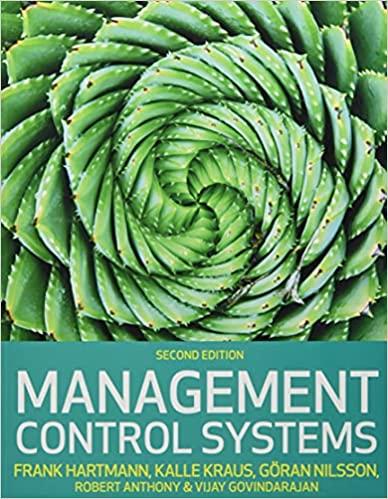Question
The Kansas Corporation manufactures filing cabinets in two operations: machining and finishing. It provides the following information: Data table Machining Finishing Annual capacity 140,000 units
The Kansas Corporation manufactures filing cabinets in two operations: machining and finishing. It provides the following information:
Data table
|
| Machining | Finishing |
| Annual capacity | 140,000 units | 115,000 units |
| Annual production | 115,000 units | 115,000 units |
| Fixed operating costs (excluding direct materials) | $1,610,000 | $1,380,000 |
| Fixed operating costs per unit produced ($1,610,000 115,000; $1,380,000 115,000) | $14 per unit | $12 per unit |
Each cabinet sells for $65 and has direct material costs of $25 incurred at the start of the machining operation. Kansas has no other variable costs. Kansas can sell whatever output it produces. The following requirements refer only to the preceding data. There is no connection between the requirements.
Requirement 1.
Kansas is considering using some modern jigs and tools in the finishing operation that would increase annual finishing output by 1,350 units. The annual cost of these jigs and tools is $25,000. Should Kansas
acquire these tools? Show your calculations.
Producing 1,350 more units will generate
less
more
contribution (throughput) margin and operating income because
finishing is a bottleneck operation; machining is not
machining is a bottleneck operation; finishing is not
.
Part 2
Select the formula, then enter the amounts to calculate the change in throughput contribution.
|
|
|
|
| Change in throughput |
|
|
| = | contribution | |
|
|
| = |
|
Part 3 Should Kansas acquire these tools?
| The |
| in throughput contribution margin is |
| the incremental costs by |
| . | |
| Therefore, Kansas |
| implement the new design. | |||||
Part 4
Requirement 2. The production manager of the Machining Department has submitted a proposal to do faster setups that would increase the annual capacity of the Machining Department by
14,000
units and would cost
$28,000
per year. Should
Kansas
implement the change? Show your calculations.
Finishing is not a bottleneck operation; machining is.
Machining is not a bottleneck operation; finishing is.
Increasing its capacity further
will
will not
increase contribution (throughput) margin.
Kansas
should
should not
implement the change to increase production.
Part 5
Requirement 3. An outside contractor offers to do the finishing operation for
14,000
units at
$24
per unit,
double
the
$12
per unit that it costs
Kansas
to do the finishing in-house. Should
Kansas
accept the subcontractor's offer? Show your calculations.
Finishing is a bottleneck operation; machining is not.
Machining is a bottleneck operation; finishing is not.
Part 6
Select the formula you will use to calculate the change in throughput contribution. Then, enter the amounts in the formula and calculate the change in throughput contribution.
|
|
|
|
| Change in throughput |
|
|
| = | contribution | |
|
|
| = |
|
Part 7
| Kansas |
| contract with an outside contractor to do 14,000 units of finishing at $24 per unit because the | ||||
|
| in throughput contribution is |
| incremental costs by |
| . | |
Step by Step Solution
There are 3 Steps involved in it
Step: 1

Get Instant Access to Expert-Tailored Solutions
See step-by-step solutions with expert insights and AI powered tools for academic success
Step: 2

Step: 3

Ace Your Homework with AI
Get the answers you need in no time with our AI-driven, step-by-step assistance
Get Started


